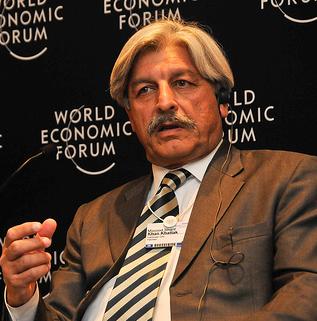[ca_audio url=”https://www.sharifpost.com/Audio/NPR/2008_12_12_All_Things_Considered.mp3″ width=”500″ height=”27″ css_class=”codeart-google-mp3-player”]
India and the U.S. are pointing to Pakistan in assigning blame for last month’s attacks in Mumbai. The Indian government says the 10 suspected attackers came from Pakistan and had support from militant groups based there. Over the past week, Islamabad has taken steps to satisfy demands for action.
The Mumbai attacks, while a horrific shock for India, have also had a profound impact in Pakistan. The country’s new and weak civilian government is being pushed hard by India and the U.S. to round up militants believed to be behind the attacks and to close down their camps.
Shuja Nawaz, author of Crossed Swords: Pakistan, Its Army, and the Wars Within, says the country needs to rein in its militant groups, something governments in Pakistan have tried to do without success. Nawaz says India needs to look inward as well, and that Pakistan is wrongly bearing the brunt of the blame.
“It’s been made to be responsible for taking actions, and I think actions by Pakistan alone are not going to solve this problem,” Nawaz says. “It still remains an Indian problem, too.”
Responding To Pressure For Action
Nonetheless, Pakistan has responded to Indian and U.S. pressure to take action. Earlier this week, the army raided compounds belonging to the militant group Lashkar-e-Taiba. It arrested more than 20 suspected members, including two of the group’s senior leaders. Then security forces went after Jama’at-ud-Da’wa, the Islamic charity that the U.S. says is merely a front for Lashkar-e-Taiba.
On Wednesday, the U.N. Security Council designated the charity a terror organization. Pakistan closed several offices of Jama’at-ud-Da’wa and froze its assets. Hafiz Mohammed Saeed, its virulently anti-India leader, denounced the raids during a press conference from the charity’s headquarters in Lahore.
“If there is any evidence against Jama’at-ud-Da’wa either from India or the U.S.A., we are ready to face any court,” Saeed said. “Slapping a ban on J.D. clearly indicates that this decision is based on ill-intentions and is nothing else but enmity toward Islam.”
Shortly after his news conference, Saeed was put under house arrest for at least three months, though no charges have been leveled against him. There is concern both in New Delhi and Washington that Pakistan might follow a familiar pattern — hold suspected militants for several months, then quietly let them go.
Waiting For Proof From India
Islamabad says it is still waiting for any information from India to back up its allegations. Masood Sharif Khattak, a director of Pakistan’s intelligence bureau under Benazir Bhutto, says unsubstantiated accusations put a strain on Pakistan.
“Just saying that so-and-so is involved, that is not good enough when it comes to matters of state,” Khattak says. “If you have anything solid, they should have presented it to the government of Pakistan.”
Even though it was the U.N., and not just India and U.S., that wanted Jama’at-ud-Da’wa closed down, Islamabad still runs the risk of a backlash by going after an Islamic charity that operates hundreds of schools and medical centers across the country.
Author and analyst Zahid Hussein says the fragile Pakistani government can only do so much so fast to stamp out Islamist militant groups.
“If you put Pakistan too much in the corner, then obviously it will be counterproductive,” Hussein says. “And any destabilization of Pakistan will unravel the whole area. The international community should understand that if [the] Pakistan state collapses, then who is going to benefit from that? Obviously the extremists.”
Hussein says the Security Council’s decision gives the Pakistani government political cover to close the charity’s offices and arrest suspected militants. But Pakistan is firm that it will not hand over any suspects to India, and author Nawaz says that could be the tipping point for Pakistan.
“The one thing obviously in any India-Pakistan exchange is the optics,” Nawaz says. “You have to not be seen as capitulating in any way.”
Still, the pressure on Pakistan is increasing. In the past few days, India has doubled the number of suspects it wants arrested and it has increased its rhetoric, calling Pakistan the epicenter of terrorism.
http://www.npr.org/templates/story/story.php?storyId=98195227
